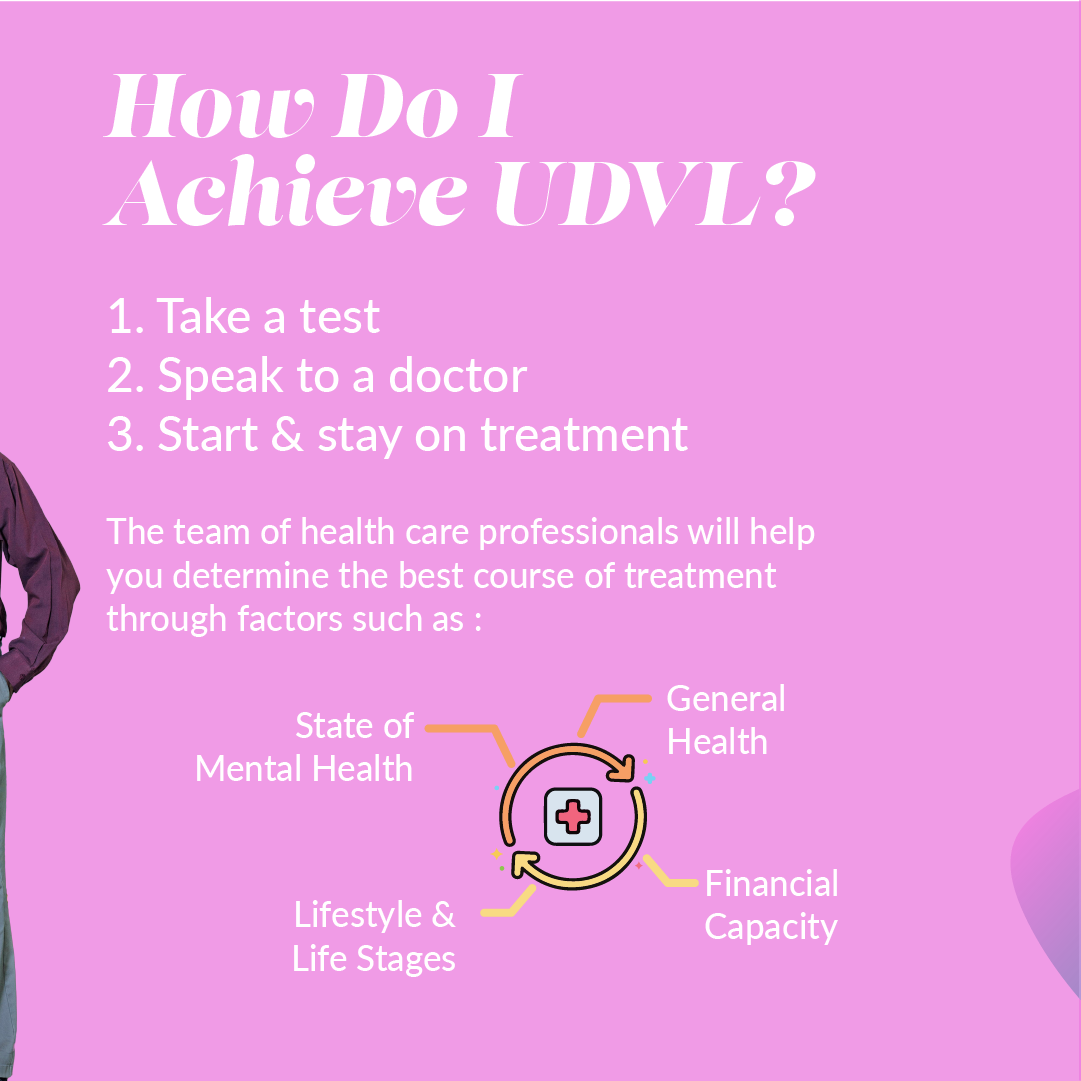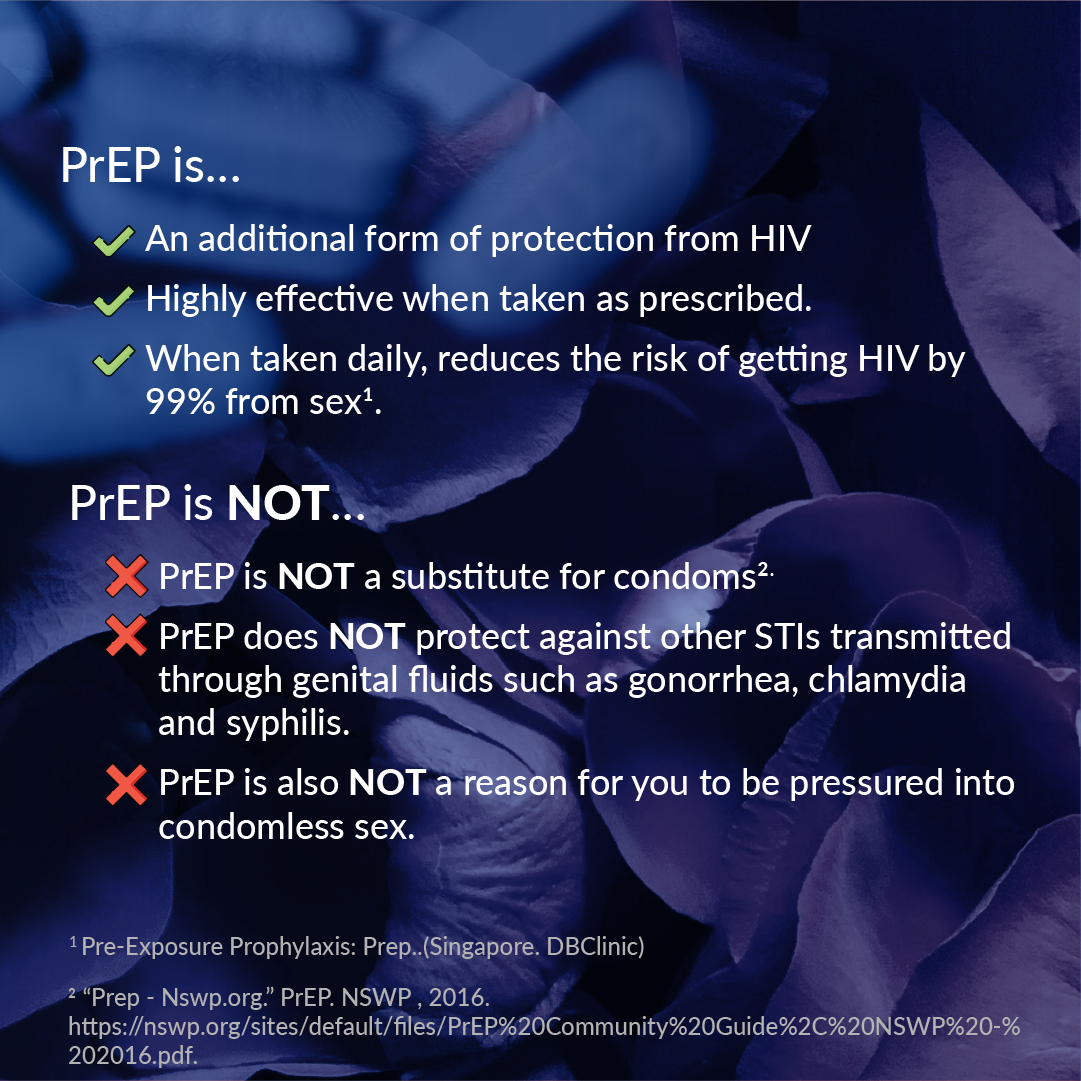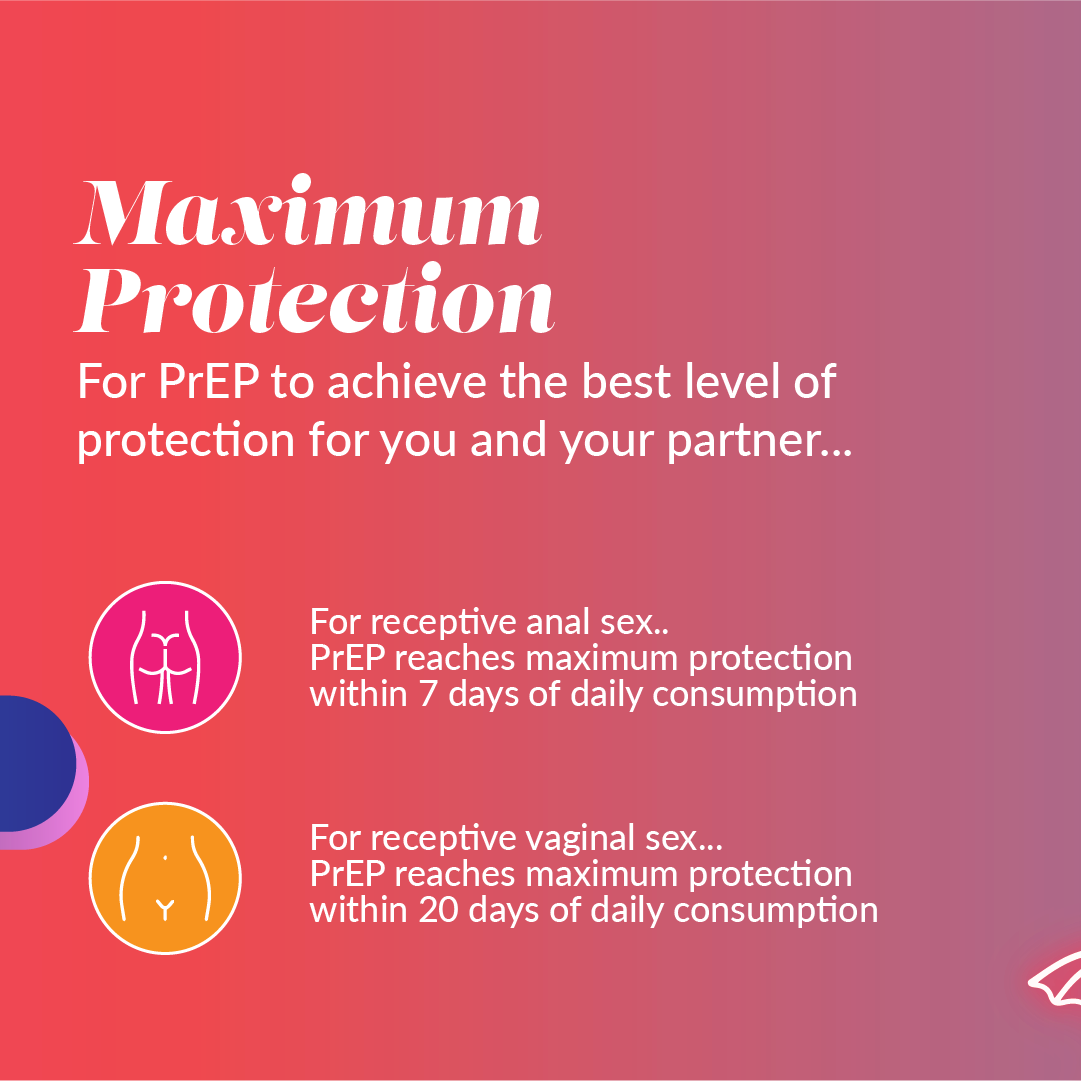Did you know? While HIV and AIDS are commonly associated, they are not the same! There are many myths and misconceptions about the differences between them, the modes of transmission, possible treatments and the life one may lead upon infection.
| Human Immunodeficiency Virus (HIV) | Acquired Immunodeficiency Syndrome (AIDS) |
| A virus that attacks the cells in a person’s immune system, eventually weakening it. If HIV is left untreated, it can eventually lead to AIDS. | A condition of a compromised immune system that cannot respond properly and starts to fail. |
When left undetected and untreated via antiretroviral therapy, HIV leads to AIDS.
Sex with HIV-infected peoples who are actively being treated for it via antiretroviral therapy and have an undetectable viral load also cannot lead to HIV being transmitted. This is known as U=U or Undetectable = Untransmissable, which we will cover below!
Knowing when to test is just as important as testing? Different sexually transmitted infections (STI) take different times to develop. This timing, the Window Period, can vary depending on the type of STI and it refers to the time between a possible exposure to a successful detection of the STI.
*If you think you may have contracted HIV, start Post Exposure Prophylaxis (PEP) within 72 hours. PEP can reduce your chance of becoming HIV positive by up to 80%.
*It is recommended to test again at the 90 day mark
The HIV tests look for antibodies produced by the body as a result of the HIV infection, which the human body usually takes about 1 to 3 months to produce. After suspected exposure to HIV, a test may be taken about 1 month after the date but a repeat test after a period of about 3 months is recommended.
However, using a 4th generation test, you can be tested for HIV 14 days after possible exposure. Instead of testing for antibodies, this test detects the presence of HIV antigens.
After 90 days, or about 3 months, if you test negative for all your STIs, it means you are clear and safe. However, this is only if you have not had unprotected sex in the last 90 days. Getting tested after every possible exposure or once every 3 to 6 months is recommended.
What are the benefits of modern HIV Treatment?





Undetectable = Untransmittable (U=U) means that if an individual living with HIV has an Undetectable Viral Load (UDVL), the virus is NOT transmittable through sex and in the absence of breastfeeding, risk of HIV transmission from mother to infant is reduced to 0%.
*If you plan to breastfeed your child, please consult your doctors before doing so.
According to Professor Paul Anantharajah Tambyah (NUH), with modern treatment, undetectable viral loads can be achieved and maintained effortlessly.

Source: @projectx.sg on Instagram
Everyday, people living with HIV continue to face huge amounts of stigma, much of it stems from fear. With modern HIV treatment, individuals living with HIV can have healthy and fulfilling lives without passing the virus on to anyone else. Break the cycle of hurt, spread the message of U=U!
Yes! Post-Exposure Prophylaxis (PEP) is a short-term medication that is taken 72 hours after a potential high-risk HIV exposure. Prophylaxis refers to the treatment administered to prevent the infection, usually in the form of pills.
When it comes to seeking treatment using PEP, it is crucial that you call or visit the A&E within 72 hours. Here, you will take a blood test, receive a confirmation via your results, receive medication, and begin your PEP prescription.
*If you were sexually assaulted and wish to seek support from Project X, you may call or text
9060 9906, Mondays to Fridays, 3pm-11pm.
PEP can reduce your chances of becoming HIV positive should you be exposed to HIV. It is more effective the sooner you start the treatment and take the medication.
“When taken as directed, PEP can work effectively” Dr Brenda Mae Salada (NUH). Yes, PEP is safe! But some side effects include stomach aches, fatigue. PEP is meant to be taken for at least 28 days after which a follow-up test will be administered. You will also undergo a HIV test 4-6 weeks after exposure, followed by another 3 months later. If PEP fails, you may experience early HIV symptoms such as a fever or rash. Take an HIV test if symptoms persist and seek treatment immediately.
| Clinic | Cost | LGBTQ Friendly | 24 Hours |
BePrep Clinic at NUSHW (referral from A&E) | $ |  | |
| Sengkang Hospital | $ |  | |
| Changi General Hospital | $ |  | |
| Tan Tock Seng Hospital | $$ |  | |
| DSC Clinic | $$ | ||
| Kensington Family Clinic | $$$ | ||
| Tanjong Pagar Medical Clinic | $$$ |  | |
| Dr. Tan Medical Center | $$$ |  | |
| Dr. Tan & Partners | $$$$ |  | |
| Anteh Dispensary | $$$$ | ||
| M Lam Clinic | $$$$ | ||
| SHIM Clinic | $$$$ |
*$ ($500-$1000), $$ ($1000-$1500), $$$ ($1500-1900), $$$$ ($1900 onwards)
**The above information is valid and accurate as of Nov 2022.
For that, we have Pre-Exposure Prophylaxis (PrEP)! PrEP refers to anti-HIV medication taken consistently before coming into contact with HIV.
As summarised below, it is important to note that PrEP is NOT a substitute for condoms and other safe-sex practices, does NOT protect against other STIs and is NOT a reason for your sexual partner(s) to pressure you into condomless sex.

Source: @projectx.sg on Instagram
*PrEP can protect your infant from HIV transmission during conception, pregnancy and the breastfeeding period.
Yes! When used as prescribed by a licensed healthcare provider, PrEP is safe, effective and affordable. However, PrEP users may experience some initial side effects such as:
These side effects will usually go away within the first month of taking PrEP.

Source: @projectx.sg on Instagram
Getting PrEP prescribed to you consists of a number of steps. It can only be administered to you by a healthcare provider after assessing your suitability for the medication, firstly, via a health screening, and a required HIV test to ensure that you are HIV negative. A prescription lasts for about 3 months or 90 days at most. After the end of the 30 days, your prescription will be reassessed if you still require PrEP.
Are you a sex worker and in need of PrEP? Give us a call at 9060 9906!
While sex work is not inherently violent, sex workers can face extremely high levels of violence in the form of stigma, discrimination and criminalisation of sex work.
Conversations are half the battle. We need to change values to promote respect and responsibility for sex workers and this can occur in our every conversations! We can respond to prejudice and bias in conversations by…
Know your Rights. Protect Yourself.
Did you know? While HIV and AIDS are commonly associated, they are not the same! There are many myths and misconceptions about the differences between them, the modes of transmission, possible treatments and the life one may lead upon infection.
Human Immunodeficiency Virus (HIV)
Acquired Immunodeficiency Syndrome (AIDS)
When left undetected and untreated via antiretroviral therapy, HIV leads to AIDS.
Knowing when to test is just as important as testing? Different sexually transmitted infections (STI) take different times to develop. This timing, the Window Period, can vary depending on the type of STI and it refers to the time between a possible exposure to a successful detection of the STI.
What are the various Window Periods?
*If you think you may have contracted HIV, start Post Exposure Prophylaxis (PEP) within 72 hours. PEP can reduce your chance of becoming HIV positive by up to 80%.
*It is recommended to test again at the 90 day mark
The HIV tests look for antibodies produced by the body as a result of the HIV infection, which the human body usually takes about 1 to 3 months to produce. After suspected exposure to HIV, a test may be taken about 1 month after the date but a repeat test after a period of about 3 months is recommended.
However, using a 4th generation test, you can be tested for HIV 14 days after possible exposure. Instead of testing for antibodies, this test detects the presence of HIV antigens.
After 90 days, or about 3 months, if you test negative for all your STIs, it means you are clear and safe. However, this is only if you have not had unprotected sex in the last 90 days. Getting tested after every possible exposure or once every 3 to 6 months is recommended.
Recent advancements in HIV medication means your treatment combinations can be as easy as…
Undetectable = Untransmittable (U=U) means that if an individual living with HIV has an Undetectable Viral Load (UDVL), the virus is NOT transmittable through sex and in the absence of breastfeeding, risk of HIV transmission from mother to infant is reduced to 0%.
*If you plan to breastfeed your child, please consult your doctors before doing so.
According to Professor Paul Anantharajah Tambyah (NUH), with modern treatment, undetectable viral loads can be achieved and maintained effortlessly.

Break the Stigma!
Everyday, people living with HIV continue to face huge amounts of stigma, much of it stems from fear. With modern HIV treatment, individuals living with HIV can have healthy and fulfilling lives without passing the virus on to anyone else. Break the cycle of hurt, spread the message of U=U!
Yes! Post-Exposure Prophylaxis (PEP) is a short-term medication that is taken 72 hours after a potential high-risk HIV exposure. Prophylaxis refers to the treatment administered to prevent the infection, usually in the form of pills.
When it comes to seeking treatment using PEP, it is crucial that you call or visit the A&E within 72 hours. Here, you will take a blood test, receive a confirmation via your results, receive medication, and begin your PEP prescription.
Who is PEP for?
*If you were sexually assaulted and wish to seek support from Project X, you may call or text
Who is PEP for?
PEP can reduce your chances of becoming HIV positive should you be exposed to HIV. It is more effective the sooner you start the treatment and take the medication.
Who is PEP for?
“When taken as directed, PEP can work effectively” Dr Brenda Mae Salada (NUH). Yes, PEP is safe! But some side effects include stomach aches, fatigue. PEP is meant to be taken for at least 28 days after which a follow-up test will be administered. You will also undergo a HIV test 4-6 weeks after exposure, followed by another 3 months later. If PEP fails, you may experience early HIV symptoms such as a fever or rash. Take an HIV test if symptoms persist and seek treatment immediately.
Where can I get PEP?
| Clinic | Cost | LGBTQ Friendly | 24 Hours |
BePrep Clinic at NUSHW (referral from A&E) | $ |  | |
| Sengkang Hospital | $ |  | |
| Changi General Hospital | $ |  | |
| Tan Tock Seng Hospital | $$ |  | |
| DSC Clinic | $$ | ||
| Kensington Family Clinic | $$$ | ||
| Tanjong Pagar Medical Clinic | $$$ |  | |
| Dr. Tan Medical Center | $$$ |  | |
| Dr. Tan & Partners | $$$$ |  | |
| Anteh Dispensary | $$$$ | ||
| M Lam Clinic | $$$$ | ||
| SHIM Clinic | $$$$ |
*$ ($500-$1000), $$ ($1000-$1500), $$$ ($1500-1900), $$$$ ($1900 onwards)
**The above information is valid and accurate as of Nov 2022.
For that, we have Pre-Exposure Prophylaxis (PrEP)! PrEP refers to anti-HIV medication taken consistently before coming into contact with HIV.
As summarised below, it is important to note that PrEP is NOT a substitute for condoms and other safe-sex practices, does NOT protect against other STIs and is NOT a reason for your sexual partner(s) to pressure you into condomless sex.

Source: @projectx.sg on Instagram
Who is PrEP for?
*PrEP can protect your infant from HIV transmission during conception, pregnancy and the breastfeeding period.
Yes, PrEP is NOT suitable for
Yes! When used as prescribed by a licensed healthcare provider, PrEP is safe, effective and affordable. However, PrEP users may experience some initial side effects such as:
These side effects will usually go away within the first month of taking PrEP.
Other information about PrEP…

Source: @projectx.sg on Instagram
While sex work is not inherently violent, sex workers can face extremely high levels of violence in the form of stigma, discrimination and criminalisation of sex work.
How can I be apart of destigmatising sex work?
Conversations are half the battle. We need to change values to promote respect and responsibility for sex workers and this can occur in our every conversations! We can respond to prejudice and bias in conversations by…
Know your Rights. Protect Yourself.
Are you in a crisis & need immediate assistance? Do you need someone to talk to? Project X is here & we can help.
Call our Helpline at +65 9060 9906
Visit Get Help page to learn more
Kheng Leng is a Registered Social Worker with the Singapore Association of Social Workers. Prior to joining Project X, she worked extensively with youths-at-risk and on issues of intergenerational poverty in Singapore. She is experienced in pioneering innovative social services such as setting up a Collective Impact initiative to support the lower-income families at Spoooner Road and operationalising the first boarding campus for lower-income families at Spooner Road and operationalising the first boarding campus for lower-income youths at =Dreams.
Kheng Leng firmly believes that every person deserves to live their potential. She hopes to develop the social work services at Project X and provide our community with right resources and opportunities at whatever stage of their lives.
Kheng Leng holds a Bachelor of Social Sciences (Highest Distinction) from the National University of Singapore.
Vanessa has been full-time with Project X since 2011, and as a result, has had many opportunities to meet and connect with sex workers in Singapore and around the world. Under her leadership, the organisation has grown from a small group of volunteers to one where there are three paid staff and a team of over 60 volunteers. Correspondingly, she has increased the annual operating budget of the organization five times, and is now recognized as the leading organization that empowers and assists women in the sex industry.
Vanessa has written and spoken extensively about sex work, human trafficking, rape culture, and LGBTQ rights in Singapore. She believes that if people can speak about sex, gender and sexuality in open and in non-judgmental ways, society will become a safer place for everyone.
Vanessa holds a Bachelor’s Degree in Economics from the University of Warwick, and a Masters Degree in Gender, Society and Representation from University College London.